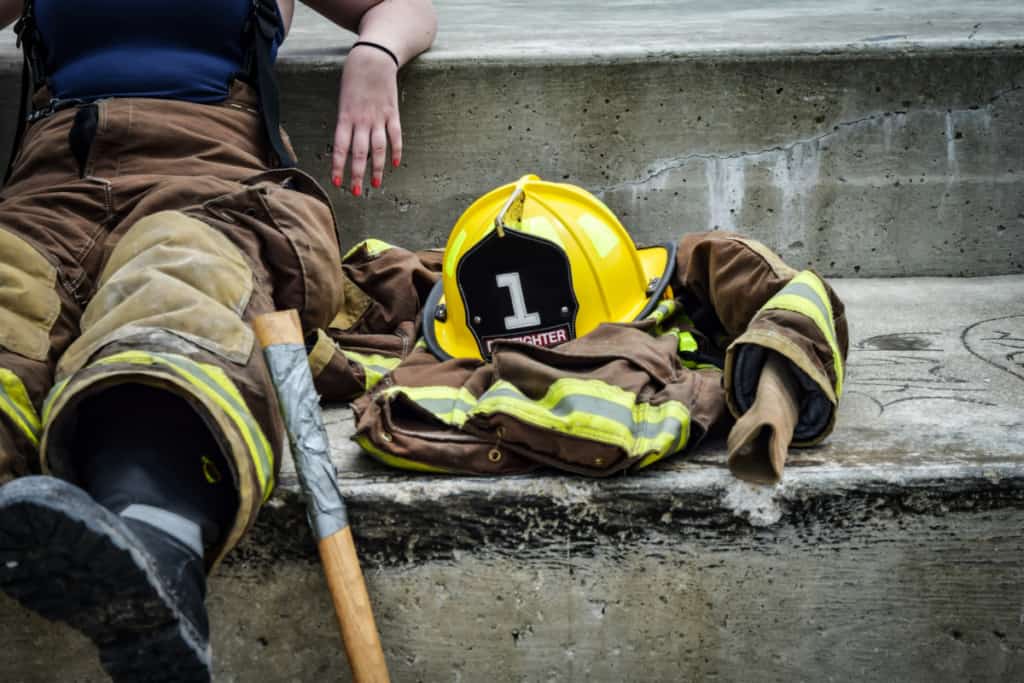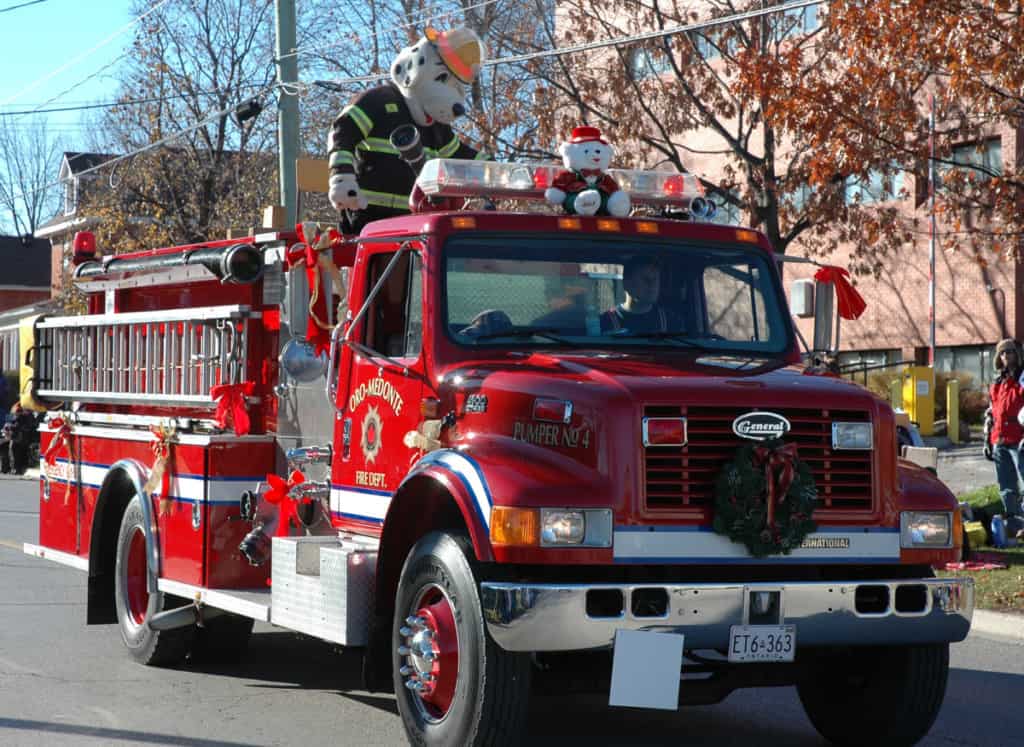Thinking about becoming a firefighter and wondering what the difference between the fire academy and a fire science degree is? Well, you’re not alone, many would-be firefighters struggle with this idea at first, but the good news is that you don’t have to because we’ve got everything you need to know about these two programs of study, right here.
Every single firefighter will attend the fire academy, it’s a pre-requisite to becoming a firefighter. A fire science degree, on the other hand, is an optional program of study which can lead to additional opportunities within the fire service.
Training and learning are a huge part of the fire service. Both the fire academy and a degree in fire science can be very helpful for aspiring firefighters. Here’s everything you need to know.
Your # 1 priority is keeping your family safe. As a firefighter, I recommend everyone has updated smoke detectors that don’t require battery changes, like these ones from Kidde, a fire extinguisher, like this one from Amerex, and a fire escape ladder if you have bedrooms above the first floor, I recommend this one from Hausse.
Also read: How Hard is the Fire Academy? Are You Ready?
What Is The Fire Academy Like?
We’ve gone into much more detail about your time in the fire academy here. So, this is a short synopsis of the key elements of your time at the fire academy.
Firstly, we need to be clear that you will be expected to attend the fire academy as part of your hiring process and, eventually, you may be allowed to return to the fire academy to take advanced training.
The fire academy program typically takes around 10 – 24 weeks and includes 600 to 900 hours of intensive education. That means you can expect your time at a fire academy to be full-time – most students need to be present for between 40 and 48 hours each week during training.
Take a look at a week of training at the South Metro Fire Rescue Academy in Colorado:
Note: There are also college-hosted fire academies that you can pay to put yourself through. These are usually less of a full-time schedule, but they can vary.
Also read: How Much Does It Cost To Become A Firefighter? Firefighter Answers
Classroom Training at The Fire Academy
Your first efforts at the fire academy are to learn the technical requirements of firefighting. That means classroom-based lessons where you will be walked through the principles that you will apply in practical lessons.
This includes reading and studying both during the academy and as homework after hours. It also will include frequent testing on the classroom concepts, before you learn to apply them on the fireground.
Many people underestimate this part. The didactic (classroom) portion is a common cause of failing the academy, so you need to take it seriously and prepare yourself.
Here is the textbook I recommend studying before your academy starts. This can give you a big leg-up and make your academy experience smoother.
Practical Training At The Fire Academy
However, classroom-based learning simply isn’t a substitute for actual hands-on training and that means, eventually, you need to get practical and you will be conducting training drills on actual burning buildings and other scenarios.
Here, you need to take what you learned in the classroom and put it into action. You will be assessed on how you think and function in these drills.
And yes, you will be expected to do this in full turnout gear and Self-Contained Breathing Apparatus (SCBA) that can add about 45 pounds or more!
This training is hard.
Not every person who is admitted to a fire academy each time will graduate from it.
Some will fail the classroom training; some will fail the practical training and a few will be injured during the course of training and will be unable to complete it. It’s worth noting, that there is no guarantee that if you are injured that you will be allowed to retake the fire academy at a later date.
Thus, fire academy is a rigorous challenge that is meant to set you up to carry out the duties of a firefighter safely and efficiently and in a manner conducive to working as part of a larger team.
Here is some more good tips for those starting a fire academy soon:
Once you complete this training – you are still not a fully-fledged firefighter, you will then be expected to successfully pass a probationary period within the department that you are being hired by.
Also read: Can You Fail the Fire Academy? Yes, Here’s How
What Do You Learn In A Fire Science Degree?
In contrast, you are not expected to study a fire science degree to become a firefighter.
Many departments are giving more preference to candidates with college degrees, even if it is not required to apply.
Firstly, this kind of degree which will take between 2 and 4 years of study (depending on the level of degree and method of study) is able to go into much more detail on the technical aspects of firefighting than the academy can.
The typical program of study will include some or all of the following:
- EMT Basics – all firefighters now need to be qualified at an EMT-basic level and there are big advantages to becoming even more skilled in emergency medicine.
- Chemistry of Fire Science – the absolute fundamentals of why certain types of fire burn the way that they do.
- Fire Codes and Laws – an in-depth look at what is expected in the law particularly from those engaged in the action of construction and how to assess whether these expectations are being met either in full or in part and what actions can be taken against those who have failed to meet expectations.
- Fire Prevention – everyone knows that prevention is better than the cure, right? Well, it’s true of fires too. It is usually far cheaper and easier to stop a fire from breaking out than it is to extinguish one once it has been allowed to catch fire. However, there’s some resistance to preventative measures because, rather like insurance, you tend to only be grateful for them when the worst actually happens.
- Emergency Management – firefighters do more than extinguish fires. They also have to be capable of managing the entire scene of an emergency or even the organization of a whole fire department. They have to be able to take actions to protect themselves and the general public and reduce risks wherever possible and practical. This is a whole discipline in and of itself.
- Fire Investigation – yes, some people start fires for fun and/or profit, and somebody needs to stop this from happening because it’s both dangerous to people and expensive to the economy. The first step to preventing future arson is to work out what happened when a fire is deliberate and ensuring that the right parties are held responsible.
- Hazardous Materials Management – there are certain chemicals that are much more dangerous than others in terms of their fire risk. For example, you don’t need to take many precautions when storing water because, by definition, water doesn’t burn. Swap water for hydrogen gas, though? Then it’s a whole different story. Knowing how each material should be handled and stored is an essential aspect of fire safety.
- Disaster And Fire Defense Planning – what happens when the fire service is part of a major incident like 9-11 or the California Forest Fires? Well, that’s where disaster and defense planning experts come in. It’s their job to work out what might go wrong and then to plan to prevent it but without breaking the budget.
It’s important to realize that even if you obtain a degree in fire science, you will not be exempted from the need to attend the fire academy.
The degree will, however, put you in a good spot if you want to specialize in a specific discipline within the fire service or if you are seeking to be promoted and attain rank.
Also read: What Should Firefighters Major In? Firefighter College Degrees and Do You Need a College Degree to Be a Firefighter? Real Answer
Which Is Better For Becoming A Firefighter?

Better is the wrong word here. Strictly speaking, as you can’t be a firefighter without attending the fire academy, but you can without a fire science degree – fire academy is “better” but it’s a meaningless distinction.
Fire Academy is a practical course that prepares you to fight fires.
Fire science degrees provide a broader range of knowledge that may be useful in more circumstances.
You should think about what you want from your career before electing for a fire science degree. If you want to rise up through the ranks or undertake specialist employment, the costs and the time commitment can easily be repaid.
On the other hand, if you dream of being a regular firefighter (and many of us do) then a college degree can still help you to get hired faster.
Conclusion
Fire academy vs fire science degree? The two are not mutually exclusive and it’s certainly not an either/or choice. In fact, every firefighter must complete the fire academy to take up work as a firefighter and a fire science degree is an optional extended program of study which can improve your career prospects.
It is worth noting that a fire science degree is not essential if you want to work as a firefighter. However, there’s nothing wrong with studying for a fire science degree, because you feel it will enhance your overall knowledge either.
Related Articles:
How To Prepare For The Fire Academy: 14 Insider Tips

